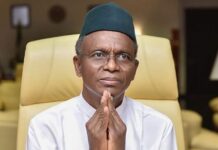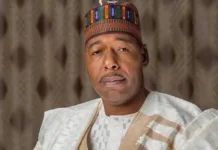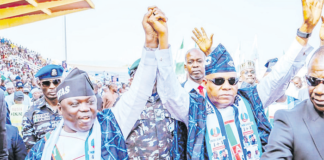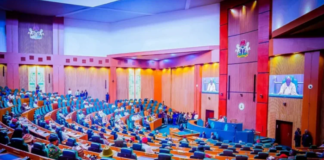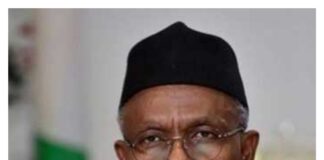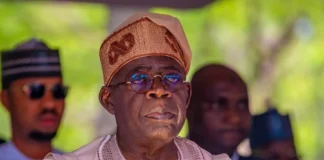First Bank Battles Arise TV CEO Nduka Obaigbena Over Alleged $225.8 Million Debt
“It was discovered that FBN had given this loan recklessly without security as part of a scheme that funded Diezani Allison-Madueke and Kola Aluko”
The Federal High Court in Ikoyi, Lagos, has issued an order restraining all commercial banks in Nigeria from releasing or managing any funds and assets totaling up to $225.8 million that are owed to Nduka Obaigbena from any accounts held by him.
Mr. Obaigbena is the chairman and editor-in-chief of THISDAY Media Group and Arise News Channel.
The court’s order also prevents banks from dealing with or releasing funds and assets belonging to Efe Damilola Obaigbena, Olabisi Eka Obaigbena, and General Hydrocarbons Limited—a company in which all three are directors and shareholders.
Additionally, banks are barred from handling or releasing any funds or assets owed to the company, its agents, affiliates, subsidiaries, and sister companies, up to the same amount, as indicated in the court documents made available to the media.
On December 27, 2024, First Bank of Nigeria Limited and FBN Quest Trustees Limited approached the Federal Court to seek these orders in relation to a total claim of $225.8 million, which they allege is outstanding debt from General Hydrocarbons’ account with First Bank as of September 30, 2024. This legal action concerns the loan facilities that were granted to General Hydrocarbons by First Bank, pending a hearing and determination of the motion for an interlocutory injunction.
The issue began when Atlantic Energy Drilling Concepts Limited, chaired by Jide Omokore—an associate of former Minister of Petroleum Diezani Alison-Madueke—took out a facility from First Bank in 2011. The $490 million loan was intended to finance the company’s operating and capital expenditure for drilling four oil wells with proven reserves, collectively known as the Forcados assets, as well as its Strategic Alliance Agreement with the Nigerian Petroleum Development Company (NPDC).
This credit was secured with Atlantic Energy’s assets and rights under the agreement, while First Bank held a charge over the company’s collection accounts. However, the situation deteriorated over time as Atlantic Energy defaulted on its repayment obligations.
Adesola Adeduntan, the former CEO of First Bank, stated in 2019, “In line with our commitment to address legacy asset quality challenges, we wrote off our exposure to Atlantic Energy, our biggest non-performing loan (NPL), in the second quarter.” Writing off this billion-dollar loan helped First Bank reduce its non-performing loan ratio from 25.3 percent in the first quarter of 2019 to 14.5 percent by June of the same year, according to the bank’s earnings report.
In a letter dated November 7, 2024, addressed to Yemi Cardoso, the governor of the Central Bank of Nigeria, which was seen by PREMIUM TIMES, Mr. Obaigbena detailed how he facilitated a meeting between Oba Otudeko, the then-chairman of FBN Holdings, and Mele Kyari, the managing director of NNPC Limited, in 2020.
“His problem was that the NNPC under the late Maikanti Baru, then GMD, NNPC had refused to sign the security documents for the now bad, non-performing loan to Atlantic Energy Drilling Concept Nigeria Limited (Atlantic Energy) for OML 26, OML 42, OML30 and OML 34 under separate Strategic Alliance Agreements between Atlantic Energy and NPDC Limited, claiming it was a fraudulent scheme to defraud the Federal Government by the then Minister of Petroleum Resources, Diezani Allison-Madueke,” Mr Obaigbena stated.
The editor-in-chief of THISDAY Media Group noted that it was obvious during the meeting, which he claimed to be part of, that the facilities granted to Atlantic Energy by First Bank did not follow due process.
“FBN was now faced with an unsecured and non-performing exposure of $718M and was on the verge of becoming a systemic risk to the banking sector,” he stated.
“It was discovered that FBN had given this loan recklessly without security as part of a scheme that funded Diezani Allison-Madueke and Kola Aluko, (details of these are still being investigated by Nigeria’s Economic and Financial Crimes Commission“EFCC” and the United Kingdom’s National Crime Agency “NCA”),” Mr Obaigbena further stated.
According to the letter, Mr Otudeko sought Mr Obaigbena’s help to help rescue First Bank from an imminently disastrous situation, causing the two agree to work together since the latter held an approved oil mining lease (OML) from ex-President Umaru Yar’Adua.
Mr Obaigbena said the licence was then ratified by former President Muhammadu Buhari, resulting in OMLs 120 and 121 being granted to General Hydrocarbons in 2021.
Following a series of meetings between First Bank and General Hydrocarbons, he said there was an agreement based on the fact that he held a valid OML award that First Bank would finance the optimum exploration, development and production of OML 120.
Part of the terms, he added, was that General Hydrocarbons would share the profit equally with First Bank over eight years to help the latter “reduce the holes in their books” caused by their bad loans particularly the facilities availed to Atlantic Energy.
“However, we made it clear that we are not Atlantic Energy and would never assume their obligations which was then being pursued by AMCON and EFCC and our central role was to assist FBN return to good standing with a totally different transaction structure as GHL has no nexus with Atlantic Energy.”
The letter stated that First Bank sold its outstanding exposure as an Eligible Bank Asset (EBA) to AMCON at a discount to be paid off by its share of profit from the deal it earlier reached with General Hydrocarbons.
It added that the lender agreed to a clawback provision with AMCON, meaning that in the event that the outstanding exposure was not paid, AMCON would recover the EBA from First Bank’s books
The THISDAY newspaper editor-in-chief stated that First Bank, AMCON and General Hydrocarbons signed an outstanding exposure tripartite deed allowing Global Hydrocarbons to guarantee payment of a pending of a now discounted outstanding exposure of $600 million in naira on the books of the bank.
The deal, he claimed, was in exchange for financing the optimum exploration, development and production of OML 120 by FBN.
“Once GHL signed the Outstanding Exposure Tripartite Deed effective 31st December 2021, FBN’s account which was then classified by the Central Bank of Nigeria (CBN) was now whole again having escaped a loan loss provision of 302Bn Naira against a profit of 151Bn Naira ultimately declared for the year ending 31st December 2021,” the document stated.
“Had GHL not signed and guaranteed the EBA to AMCON, FBN’s loss for 2021 would have been 161Bn Naira, a whopping amount for the financial sector at that time, when the exchange rate was N400 – $1 having regard to the fact that this loan had been classified and non performing since 2015 (six years before).”
Mr Obaigbena alleged that the bank put stumbling blocks in the financing of the development of OML 120 in breach of the outstanding exposure tripartite deed.
More than seventy utilisation requests made by General Hydrocarbons in respect of the facility took First Bank between seven and 67 days to pay instead of five days, he added, causing significant losses to Global Hydrocarbons.
“FBN’s reluctance to pay as at when due started soon after consultants appointed and working for FBN and AMCON started making demands of GHL for “fees” not connected with the transaction. Indeed, GHL told the consultants that this would amount to bribery and corruption (we have evidence).”
“Since FBN got its way and avoided the 160Bn Naira loss following GHL’s signing of the Outstanding Exposure Tripartite Deed and with its account now performing, FBN has failed, refused and/or declined to perform its obligations under the MOU and the Outstanding Exposure Tripartite Deed, contributing to GHL’s loss of the Blackford Dolphin drill ship for which we are currently facing claims of over $100M (One Hundred Million Dollars) now in Arbitration.”
The document further noted that Global Hydrocarbons requested a $53 million facility from First Bank on on 28 August 2024, which was granted two months after by which time the lender “smuggled in a new variable of the appointment of an Independent Asset Manager” under a framework agreement that sought to effectively replace key components of the foundational MOU, unknown to the Tripartite Deed between AMCON, FBN and GHL and also unknown to the Petroleum Industry Act.
Mr Obaigbena alleged the framework document intended to give First Bank full control over OML 120.
“Mr. Governor, we have been left with no choice but to go to court and arbitration to preserve our fundamental rights and our rights under the agreements in the face of FBN’s attempts to clubber and bully us out of existence,” he said.
“We are seeking to enforce the provision of our MOU which allows us to raise finance independent of FBN when they fail to do so, for which they have failed abysmally. After over three and half years (3.5) years, all we have received from FBN is bad faith.”
On December 27, 2024, First Bank and FBN Quest filed a motion with the Federal High Court in Ikoyi, Lagos. They requested an order that would prevent all commercial banks in Nigeria from releasing or dealing with any funds or assets totaling up to $225.8 million that are due to the editor-in-chief of THISDAY from any of his accounts.
The plaintiffs also sought a similar order to restrict the banks from handling or releasing any funds or assets belonging to Ms. Efe Damilola Obaigbena, Ms. Olabisi Eka Obaigbena, and General Hydrocarbons Limited, up to the same amount. Additionally, the banks were barred from dealing with or releasing any funds and assets related to the company, its agents, privies, subsidiaries, and sister companies concerning this sum.
On December 30, 2024, Justice D.I. Dipeolu of the Lagos court granted these orders and scheduled a hearing for January 20, 2025.


